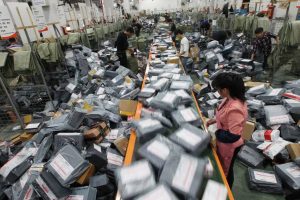

5 Exciting 11.11 Shopping Festival Highlights You Should Know (2021)
11.11 shopping festival: On November 11, China’s Singles’ Day is a big offline and online sale that eclipses the Black Friday sales in the United States. This large event has been celebrated on the Mainland and worldwide. Merchants and shops jump on board with their best offers of goods and services.
In 2009, e-Commerce behemoth Alibaba launched the 11/11 holiday to boost sales during a slower time of year. The company transformed the day into a shopping occasion, with steep discounting all day long for customers to purchase anything they desired. So, this year, let’s take a look at what happened as highlights. We hope they will also give you an idea of including some activities in your China marketing strategy for next year.

11.11 Shopping Festival: Alibaba Prioritizes Greener Festival
Alibaba promised to make the 11.11 Shopping Festival more sustainable this year. The company said they used 50% less of their computing resources for every 10,000 transactions than last year. The company claimed that computing efficiency was also considerably enhanced, with a 20% increase in technology deployment efficiency and 30% CPU resource usage.
Alibaba is also improving logistics efficiency by consolidating multiple orders to deliver more than one package simultaneously to the same place. This created less pollution and was cheaper for consumers and merchants to ship their parcels. The company also launched a campaign to build public awareness of energy-efficient and low-impact goods for the first time. To encourage shoppers to buy environment-friendly products, the company gave away 100 million yuan green vouchers.
eCommerce JD.com Smashes New Record on Sales
JD.com is Alibaba’s rival that sells things online. On November 11, JD.com had 311.4 billion yuan or ($48.6 billion) of sales on their platforms, beating last year’s records. The figure that JD.com released was the amount of money spent on their eCommerce website. It does not directly translate into how much money the company has, and it does not consider the returned items from shoppers.
JD launched a pre-sale from October 20 to October 31 before official sales began immediately and continued until late Friday. Thus, this helped in increasing the sales volume in 2021. Most companies also launch early promos and end the campaigns on 11.11, so it’s no wonder that many shoppers are already on the lookout for great deals as early as late October.
Singles’ Day Festival Slowly Losing its Luster
Online shoppers in China spent $139 billion at this year’s Singles’ Day festival. Although they broke the record last year, it seems that the annual event is slowly losing its luster as people are becoming more conscious of how they spend money due to the pandemic. This year, there’s only 8% growth, which is relatively slow compared to the past couple of years. Some shoppers would instead buy for the items they need and not just want they want to buy, yet others have used this festival as a hobby as they shop for a variety of products.
The crackdown of technology companies has also affected this year’s Singles’ Day overall performance. For instance, Alibaba has been fined for breaking the rules before the annual event. The same thing happened with JD and Meituan, where regulators summoned them to lessen the marketing text messages sent to customers.
Xiaomi Tops the Chart as the Best-Selling Smartphone Company
Xiaomi was the top-selling brand in China’s Singles Day shopping holiday last November 11. The smartphone company accounted for more sales than other prominent brands, including Apple, Samsung, and even fast-growing Honor, according to JD.com. Apple and Honor are next in line, whereas the best-sellers from Xiaomi are Redmi K40 and Redmi 9A.
Overall, Xiaomi had racked up 50% of the top 20 selling devices this year. Meanwhile, Apple iPhone 13, which was recently released, also topped the charts. The sales this year show that more and more shoppers are inclined to buy products from homegrown brands.
JD.com Accepts China’s Digital Currency for the First Time
JD.com is the first eCommerce giant that accepts digital Yuan as a mode of payment from shoppers. China’s digital currency, the e-CNY, has not been officially rolled out nationwide. However, JD’s move to accept it during the biggest shopping event in the world highlights China’s central bank’s initiative to conduct a trial in a large-scale environment.
JD and China Construction Bank are working together, so there will be the adoption of digital currency. China’s digital Yuan is not a cryptocurrency like Bitcoin or Ethereum. Instead, it is a digital version of the country’s currency that will replace coins and cash in circulation. When formally rolled out, the People’s Bank of China, local banks, and other financial institutions will issue it instead of the traditional paper money.
Interested in professional website localization services to any language? Click here for information.
 +1-877-574-2407 (US and Canada Toll Free)
+1-877-574-2407 (US and Canada Toll Free)  service@limpid-translations.com
service@limpid-translations.com





